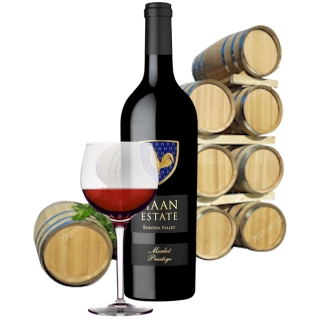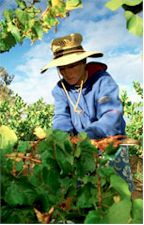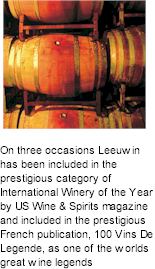


In 1972, following an extensive search for the area most suitable to produce the best varietal wines in Australia, legendary American winemaker, Robert Mondavi, identified the future site of the Leeuwin vineyard. Originally a cattle farm, Leeuwin Estate evolved, under the direction of Denis and Tricia Horgan, with Robert Mondavi acting as consultant and mentor. A nursery was planted in 1974 and the initial vineyards were deep-ploughed, deep-ripped, emptied of stone, planned, pegged, measured, marked and eventually planted by hand over a five year period from 1975.

Featuring state-of-the art facilities, the winery building was opened in 1978, celebrating with a trial vintage. Leeuwin enjoyed its first commercial vintage in 1979, and was thrust into the international spotlight when Decanter Magazine gave its highest recommendation to the 1980 Art Series Chardonnay in an international blind tasting. Maintaining a team of highly skilled and dedicated winemakers, and now under the direction of two generations of the founding family, Leeuwin now exports to over 30 countries.
Careful study, and the eventual grafting of some vines has revealed the best varieties for the Leeuwin vineyard to be Chardonnay and Cabernet Sauvignon; Riesling, Sauvignon Blanc and Shiraz make up the diversity of the vineyard, which also incorporates smaller plantings of varieties utilised for blending. Enjoying such an isolated and pristine natural environment, the emphasis of Leeuwin's viticultural practice is minimal interventionist.
Vineyards are kept balanced with the yearly environmental conditions. With the emphasis on quality rather than quantity, yields at Leeuwin are kept low. To alleviate the problem of strong winds damaging setting buds Leeuwin maintains an extensive program of tree planting. Cereal rye has been planted between every second row of vines to act as a further windbreak. A legume mulch supplies natural nitrogen as organic matter.

To reduce bird damage to grapes the Leeuwin vineyard provides a range of food alternatives. Large plots of sunflowers, sown at strategic intervals adjacent to the perimeters of the vineyard attract the parrots away from the grapes, whilst the flowers on the trees attract the Silvereyes. Working with the environment and through skilled vineyard management, Leeuwin is able to produce fine fruit in an environmentally friendly manner.
Great wines are born in great vineyards, and at Leeuwin the viticulturist and winemaker work hand-in-hand throughout the entire winemaking process, combining their skills to create wines of distinction. Boasting one of the most modern wineries in the Southern hemisphere, Leeuwin Estate offers its winemakers all the advantages of new age technology. Winemaking however, is an art as well as a science, and it is here where the skills of the winemaker are carefully combined with technology to produce the wines that have been so highly acclaimed.
Broadly following European winemaking techniques, Leeuwin is concentrating on achieving complexity, balance and longevity in its wines through a blend of modern and traditional methods. Temperature controlled stainless steel tanks, two Bucher Pneumatic presses, and a cellar of imported French oak barrels, are at the disposal of the winemaker to ensure that the fruit is transformed into the intended style of wine.
Leeuwin Estate releases its wines under three labels, the Art Series, Prelude Vineyards and Siblings. Whilst the wines in each portfolio follow different lives, they all share a place amongst the great wines of Australia, receiving much international acclaim and attention. The Art Series represents Leeuwin 's most opulent and age-worthy wines. They are identified with paintings commissioned from leading contemporary Australian Artists. The Art Series wines have obtained outstanding reviews and classifications, the Chardonnays and Cabernet Sauvignons in particular continue to be collector wines and command lofty prices at auctions the world over.
